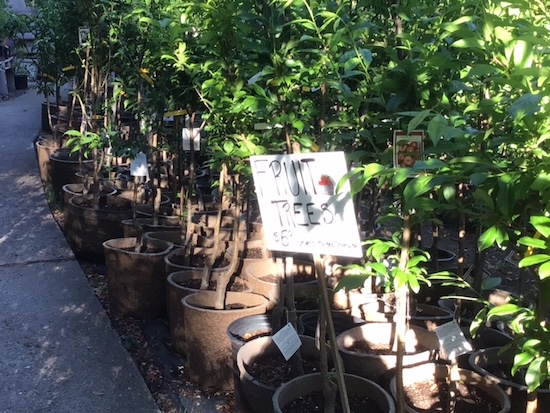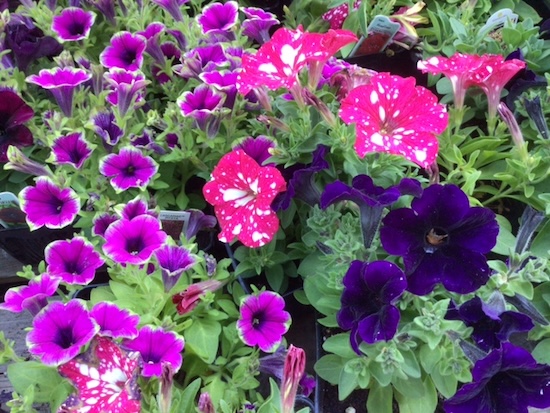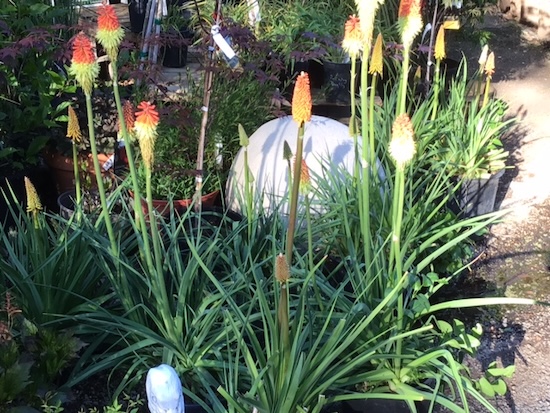
We are experiencing some of the best weather of the year right now. The hills are still green, the leaves are all fresh, and the roses are starting to bloom. Granted, the spring-blooming trees are done down here, but the Dogwoods are in full bloom on Cobb. We also had frost at the lower part of the nursery this week and are still covering our summer vegetables at night. Every day, we check the frost forecast after 3:45 pm on the lake.westernweathergroup.com website to see the prediction for Middletown for that night.
This is also the time when all the bugs hatch. The wetter and milder our winter is, like the past one, the more bugs are going to survive the winter to eat our plants and us. Many of you know mosquito-repelling plants like lavender, geraniums, and lemon-scented foliage. These include lemon balm, lemongrass, and lemon verbena. Rub the plant and then rub your exposed skin to deter being a mosquito meal. Those pesky little varieties of jewel bugs are eating our daylilies and phlox here, and a report from one of our Cobb customers is they are thick at their house. I hear HVL has a lot of whitefly issues, too. We have seen a smattering here, and we have been putting out yellow sticky traps to attract both these unwanted critters. So far, the aphids are not too bad on our roses. It might have something to do with the fact we are using bio-fungicides (Revitalize or Fungicide 5) on them. We do not spray for aphids here other than a hard spray of water, and we do use ladybugs. The jury is still out if the bio-fungicides are helping with insects and disease. They work by colonizing in the plant to make it more resistant to pathogens. We are still getting some powdery mildew on them due to the fact they are so packed in without a lot of good air circulation.

Beneficial flowering plants like marigolds, borage, sunflowers, and nasturtiums can be a big help in the vegetable garden. They either attract or repel the bad bugs away from the crops we grow. Marigolds’ scent can repel pests and attract others away from our tomatoes and peppers. Borage attracts tomato hornworms. Sunflowers attract thrips and aphids. Nasturtiums attract whiteflies, aphids, and cabbage loppers. Chives can repel aphids, and I can attest to them keeping aphids off my squash plants. Mustard is a good companion plant that attracts beetles. Limit insecticides, even organic ones, as they also kill beneficial predator bugs. If you had an infestation last year on something, try not to plant in the same place this year.

Fruit trees are another issue. The peach leaf curl bacterial fungus is horrible this year. One of my trees is completely covered. Even if you faithfully sprayed dormant spray three times in the winter, you can still get it in a wet spring. Foraging insects on the flowers can re-introduce it. Usually, we recommend copper, but copper can be hard on the trees once they have broken dormancy, and there is always the risk of copper buildup in the soil with long-term use. Debbie read something about seaweed helping, and that might be better to try at this time of year. The tree will defoliate and have to send out a whole new set of leaves, so make sure the trunk is protected from the hot sun and give it extra food. Two or more consecutive years of bad curl can weaken a tree to death. For borer and coddling moth worm protection, there are attracting pheromone traps that can help. Two in a tree for control or one every 8 trees or so to monitor for spray time.
Now is the time to check your irrigation system to make sure it is working properly and to fix any leaks. Usually, you are safe to plant those frost-sensitive summer annuals like zinnias, nasturtiums, and marigolds, along with cold soil-sensitive vegetables like basil, cucumbers, melons, and eggplant. Tomatoes and peppers can tolerate temps in the higher 30s here, but the others do not like it, especially if it is wet. That is one reason you do not see annual vinca available til later in the spring. Prune and shape your spring-blooming shrubs like lilacs if they are done blooming. If you have not done your spring fertilizing, you had better get on it. Spring is when most plants put on most of their annual growth, so do not starve them if you want them to perform.

We missed Ron/Razors Edge due to an injury at our Spring Sharp event, but a lot of you still took advantage of our weekend-long sale and the Master Gardeners Help Desk. It was also our first nice weekend of the year. It looks like this weekend will again be cooler with rain, too. The nursery truly is packed right now and looking glorious, from summer vegetables and flowering annuals to fruit and shade trees to roses and shrubs. Summer flowering bulbs like glads, peonies, and cannas are in stock, and it is not too late to do seed on summer annuals and vegetables.
Open all Memorial Day Weekend. Sat and Sun 9-5 or 10-4 if raining and Monday 10-2.

May Specials
*GreenAll 2 cu. ft. bags Organic Potting Soil
Buy 3, 4th Free.
*Roses: Buy 2, 3rd Half-Off
*All fruit except Olives and Citrus
20% Off
*Specialty Petunias in 4-inch pots
$1.00 Off
*5 gal Red Hot Pokers
$24.99
